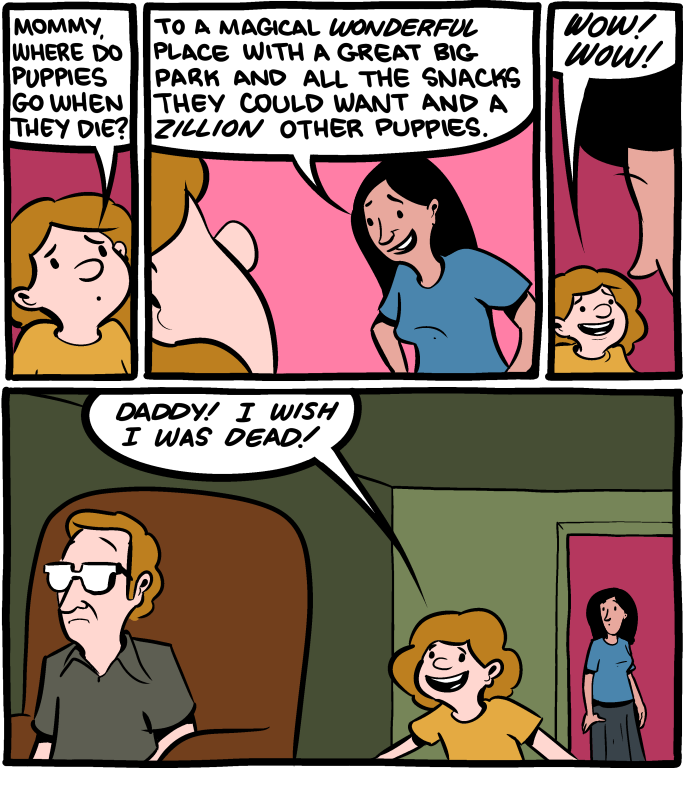Getting the Subjunctive Right
The key to the subjunctive is that the subjunctive is contrary to reality. This is not about lies (lies pretend to be reality), but about correctly describing something that isn’t. The gradeschooler in the first panel of this Frazz gets it right:
She even says it’s a wish. Don’t say something like, “I wish there was…” when you aren’t referring to something that doesn’t exist.
On a side note, I’ll add that the Greeks had a mood even stronger than the subjunctive, used only for wishes. It’s called the optative. We have to make the subjunctive work for both wishes and contrary-to-fact things.
Need a non-wish subjunctive: How about “He would go on vacation, but he’s too busy.”
Subscribe to this blog's RSS feed
Indicative or Subjunctive?
At the risk of being repetitious, here’s another example of the difference between the indicative and the subjunctive.
Here’s the rule: The subjunctive is contrary to reality. Not true; hypothetical, if you will. With the indicative, you are presumably describing reality, in other words, the truth.
Dustin’s friend is not good with words, so the subjunctive, “were better” is correct. Too bad he didn’t get the girl.
Correct Use of the Subjunctive
We use the subjunctive when we want to express something contrary to reality. (Greek has a mood called the optative, which is a step farther back than the subjunctive; it expresses a wish. In English we would say something like “would that I were dead”—but I digress.) Okay, this being contrary to reality poses a problem for this guy, in a way, and therein lies the humor.
(This is Scary Gary (the vampire on the left) for May 2, 2017.)
Owen the ghost feels alive, so for him, being dead is contrary to reality, hence the subjunctive. The humor, of course, is in his misinterpretation of Gary’s question. But his grammar is perfect.
What I’d like to know is how Gary can balance a full coffee cup on the arm of an overstuffed sofa.
A Verb Form I Don’t Often See
A second person singular subjunctive passive present progressive linking verb! First cell of a recent Arctic Circle: you could be being monitored. Savor it! I’m not even sure what order I should put the descriptors in.
It reminds me of the juvenile joke of snickering when you hear someone using the present emphatic of “do.”
The present progressive tells your reader that something is continuing to happen, right now, as you’re telling it. The past progressive says it was continuing to happen in the past, but not any more, but then you miss out on the subjunctive (the “could be”) if you want the idea of the past with subjunctive and passive, you need the present perfect: “could have been being monitored.”
Aren’t you glad you’re a native speaker of English and don’t have to think about all that stuff? But I think it’s fun for me to be being read on such esoteric subjects.
The subjunctive
English verbs can exhibit a feature called mood. Moods have to do with the the reality of what you’re speaking (or writing) about. That might not be a very useful definition, but you no doubt recognize the names of the moods from grade school. You use the indicative when you’re asserting something to be true. You use the interrogative to ask a question. The imperative is for when you give a command. And the subjunctive is for when something is not real. In English, most verbs don’t have a separate form for the subjunctive; you have to figure it out from the context.
However, the verb to be does have a subjunctive form. It’s were. Now that looks like the past tense form, so you still need some context. The context you need is some way to say that the situation is not real. For example, if you were to start a sentence with If, you should use the subjunctive.
If I were in better shape, I could swim farther. But I’m not, so I can’t.
The normal past tense (indicative) is I was. I need the subjunctive because I’m not actually in good enough shape. Could, by the way, is a modal auxiliary, and I don’t want to get into those in this post, but note that you have to write could instead of can because you’re using the subjunctive. This is intuitive for native speakers of English. People generally get the could-can dichotomy right, but people fairly commonly get the main verb wrong, saying “If I was in better shape..”
Another contextual indication of the subjunctive is to express a wish, and that leads us to today’s comic grammar lesson, and a reminder that we parents should always tell our kids the truth, from Zach Weiner’s excellent Saturday Morning Breakfast Cereal:



